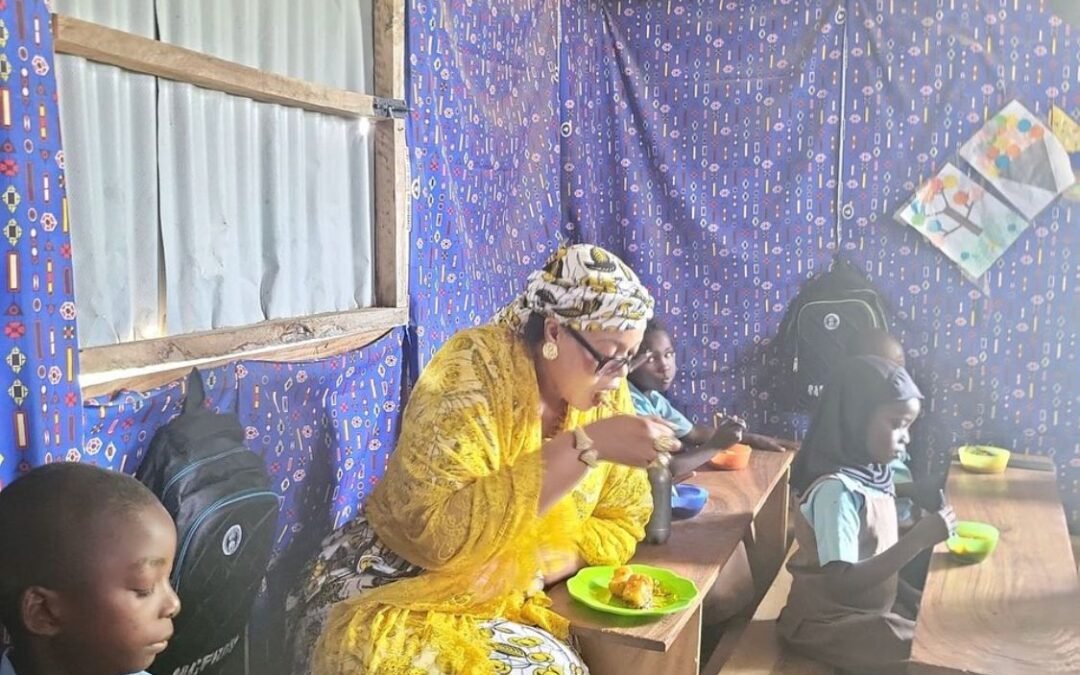The Federal Government has unveiled plans to reinvigorate the National Home Grown School Feeding Programme, setting its sights on providing nourishing meals to more than 10 million students nationwide.
This transformative initiative was highlighted by the Senior Special Assistant to the President of Nigeria on School Feeding, Dr. Yetunde Adeniji, during her visit to an IDP camp at the Transitional Learning Center in Wassa, Abuja.
The visit served as an opportunity to inspect a school feeding program made possible through the collaborative efforts of the NGO, Maple Leaf Early Years Foundation, and the National Commission for Refugees, Migrants, and Internally Displaced Persons.
Dr. Adeniji conveyed the program’s commitment to ensuring that no child attending a public school is left behind.
She praised the exemplary success of the program in Wassa, where it has not only boosted school enrollment but also significantly improved attendance rates. Beyond these immediate benefits, she emphasized its pivotal role in advancing education, alleviating hunger, and breaking the cycle of poverty.
The National Home Grown School Feeding Programme, operating under the banner of the President’s Renewed Hope agenda, is designed to target pupils from primary grades one to three across the nation. The underlying sentiment is that every child, regardless of their circumstances, deserves the opportunity to thrive and contribute to the development of the nation.

The Federal Government has unveiled plans to reinvigorate the National Home Grown School Feeding Programme, setting its sights on providing nourishing meals to more than 10 million students nationwide.
Dr. Adeniji passionately endorsed the program, emphasizing the paramount importance of education and nutrition in the holistic development of every child, particularly those in vulnerable situations. She spoke of the power of initiatives like this to create substantial positive changes in the lives of the most marginalized citizens.
“President Bola Ahmed Tinubu’s unwavering commitment to the welfare of the nation is exemplified by the Renewed Hope agenda. Within this framework, a vision is cast for a Nigeria wherein every child enjoys access to quality education and nutritious sustenance, regardless of their background or geographical location,” she stated. Dr. Adeniji underscored the belief that by investing in the youth today, a brighter and more prosperous future is being forged for the nation.
One innovative aspect of the initiative is the engagement of smallholder farmers who will supply foodstuffs for the school feeding program once it commences. Beyond addressing childhood nutrition, the program is a catalyst for families to prioritize education, with objectives aimed at increasing resilience, promoting equity, stimulating growth, and reducing poverty.
Dr. Adeniji expressed gratitude to various stakeholders, including NGOs like Plane and UNESCO, for their invaluable contributions to this noble endeavor.
She also revealed that the Federal Government has committed a substantial sum to the school feeding program, with further support from state governments.
As the program sets out on its mission to nourish the minds and bodies of over 10 million school children, the call for more collaborations with relevant agencies resounds, further reinforcing the collective commitment to ensuring that no child is left behind.

